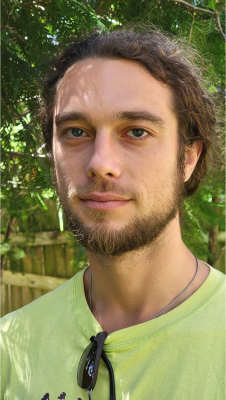Who are you?
Professionally, I’m the Program Coordinator for Crawford Stewardship Project. I was born in the barn and largely raised in the hills and valleys of the Driftless region at Dancing Waters Permaculture Cooperative in rural Crawford County. I’m an avid drinker of spring-water, pig-walla, homesteader, paddler, community organizer, nerd, and adopted Mexican.
Why the Crawford Stewardship Project for you to devote time and energy to?
 I love this place. It is special in so many ways. We have some of the best air, water, and soil in the world. We live among one of the last remaining biodiversity hot-spots in the Midwest. I had to live in Mexico and Florida and travel 25 countries for this to truly settle in for me, and I think many people here take our great blessings for granted.
I love this place. It is special in so many ways. We have some of the best air, water, and soil in the world. We live among one of the last remaining biodiversity hot-spots in the Midwest. I had to live in Mexico and Florida and travel 25 countries for this to truly settle in for me, and I think many people here take our great blessings for granted.
I also feel a great divide between where we are at in terms of climate change and biodiversity loss and contamination, and the systems we have to deal with these shifts and manage the development of our communities. Business as usual will lead us to increasing problems, and while a focus on building participation in our democratic institutions, community science, and education will not eliminate these problems, it can lead us to a more resilient and just future.
The focus of the organization is broad–can you share some examples of successful outcomes?
One has to take a somewhat nuanced and long-term view of “success” in this line of work. While many of the votes or regulatory rulings do not come down the way we would like, we can see that we are making progress towards our goals and vision.
We have built relationships with concerned citizens, farmers, businesses, and government at all levels. We have improved the available scientific data for groundwater, streams, springs, and sinkholes. We have helped people understand this unique and sensitive place we call home.
I would say that while our institutions and those who make the decisions are lagging, in the realm of public opinion we have made great strides. “Karst” , which defines our complex and highly permeable (ie: susceptible to contamination) hydrogeology, has finally entered the common vernacular. “Local control of natural resources” has gone from resulting in rolled eyes at public meetings to an important plank in both Democratic and Republican platforms. The simple fact that people are waking up to the value of this place, and the systemic issues we face, is an important success.
What are immediate needs?
We need people to engage in local government and civic organizations. While federal-level policies are truly important, the media focus on the president, supreme court, and the horse-races of partisan politics has divided us as a community to the point where it is difficult to even have a productive political conversation. At the end of the day, we only have a negligible individual impact on these issues at that level.
Meanwhile, our rural township meetings, where we can have the most input and impact, go largely unattended and ignored until some scary proposal comes down the line. Few even know who their most local elected people are, but these are the relationships that will allow us to guide the development of our communities in a direction we can all live with.
I see A LOT of collaborative allies, which is awesome. Given that there are 32 counties that are part of the Driftless Region, are you aware of other organizations like yourself in the Driftless Region?
We are blessed in this region to have a vibrant ecosystem of organizations doing important work on many levels, and CSP is committed to working collaboratively, cross-promoting, and catalyzing new groups. We work with just about anyone, when cooperation is mutually beneficial and moves us all closer to our vision of empowered communities in sustainable relationships with thriving ecosystems.
We have helped launch over a dozen local organizations of residents working on specific issues in their neighborhood, to keep growing our collective impact without overextending our small staff. As you say, the list of groups with whom we work in the region would be too extensive to name even a fraction here, but I encourage folks to check out our Community Calendar where we share important actions and events from our local networks.
CSP also facilitates bottom-up communication between grassroots organizations and neighborhoods impacted by industrial activity and state and national level organizations who claim to represent these groups. We even co-founded and continue to help lead the Sustain Rural Wisconsin Network, a coalition of grassroots groups like our own working on industrial animal agriculture issues in their communities.
What does the organization need now to best accomplish their goals for 2022-2023 and beyond?
The same thing any organization needs: people (time and energy) and money. We are constantly thanked for the work we do, but without active allies, supporters, and funding, we can not do anything. What this looks like will depend on the person, but there is never a lack of work to be done in this job. We each need to decide for ourselves where our greatest passion meets the world’s greatest need.
While we see the value of having the flexibility to be watchdogs and emergency-response by reacting immediately to unforeseen extractive and polluting industries, we also see the need to be working more proactively. We need to set the standards for our municipalities before a permit hits the table that divides the community into those who will benefit and those who will bear the costs.

